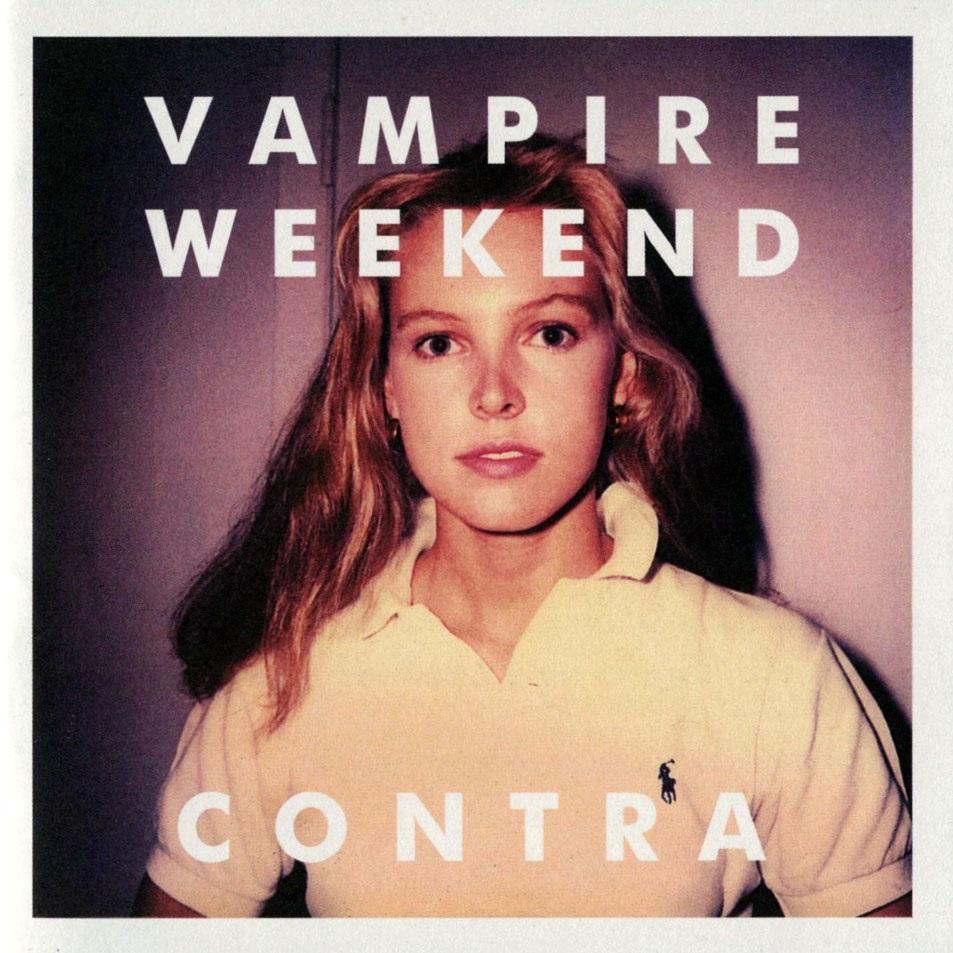Vampire Weekend : Contra

We are all victims of our own expectations. I certainly am of mine. The debut album from Vampire Weekend, released two years ago this month, was a refreshing bit of confectionery, introducing the world to “Upper West Side Soweto.” The album was a constant for me, one that I would listen to when in a funk, or at least one whose songs I would never skip in a shuffle. While many reveled in the singles that made up the first four tracks, I glommed onto the final three tracks. “I Stand Corrected,” “Walcott” and “The Kids Don’t Stand a Chance” were some of my favorite tracks of that year. But the greatness of a thing always leads one to anticipate more. Heck, that’s how the entire Hollywood system works. But, if the history of music tells us anything, second acts are a bitch.
On the surface, there is much to revel in with the return of Vampire Weekend. The Wes Anderson influences are back, including the Futura font. The self-awareness of privilege and an ’80s Ivy League sensibility have resurfaced. And yes, the African flavors, a la Peter Gabriel and Paul Simon, are still here. One can picture that the four musicians in Vampire Weekend are those kids in Rushmore Academy, they would fit in alongside Bret Easton Ellis and Jay McInerney, and they do look good in Polo shirts and pink shorts. But, there is much more going on in Contra, their highly anticipated sophomore album, than what appears on the surface.
Much has been and will be made about singer Ezra Koenig’s use of language. Koenig doesn’t rest on his ivied laurels on Contra. Though a bit forced, several lines you’d never expect to hear in a pop song show up on this album including the rhyming of horchata with balaclava and masada in the song they offered as a free download, “Horchata.” But Koenig’s words go far deeper than just an unlikely rhyme. The album’s title even holds deeper meaning, presenting a tongue-in-cheek reference to the Clash’s Sandinista!. Koenig takes the Nicaraguan polar opposites and uses them to greatly exaggerated effect in describing a relationship in “I Think Ur A Contra.” Koenig even uses the line “Complete Control” in the song, just to round out the nod to the Clash.
And there will still certainly be those fans that enjoy the singles and the singles only. “Cousins” is the first of these, and a worthy one. But, rather than sounding like the Vampire Weekend we’ve come to cherish, there is a bit of Oingo Boingo in the mix. That’s not necessarily a bad thing, and somewhat fitting with the image the band seems to project. Not knowing what the next single could be, we could guess that it might be loaded into the first half, though “Cousins” coming in as the seventh track was certainly unexpected. If I had to choose myself, I’d pick “Run.” The verses are classic VW, if such a thing exists, sounding as if it could have been a lost track from the self-titled, but then the big post-chorus celebrations are a massive left turn, leading into OMD territory. It’s as if “Campus” got mashed-up with “Tesla Girls,” and it works! Due to its hyperkinetic nature, “Giving Up the Gun” might be another good choice, showcasing again how great this band is with percussion.
Ultimately, however, my favorite tracks are the ones that are somewhat understated. “White Sky,” “Taxi Cab” and “Diplomat’s Son” are sure to be tracks that will grace my playlists for the next year. There are only a few things I can really say are disappointments about Contra. For one, the near absence of guitars, replaced by synthesizers, for the most part, makes for a slightly colder presentation. This is warmed up, as always, by Koenig’s magnetic vocals, but the absence is apparent. For another, the band should leave the Discovery bits as side projects. “California English,” with its auto-tuning, is a speed bump in an otherwise smooth ride. And, being Ivy League educated guys, Koenig and company should remember from their creative writing classes that anything that takes you out of the narrative moment should be excised. But, that’s the brilliance of the iPod generation; we can simply remove it and listen to the album without it!
Similar Albums:
Oingo Boingo – Good For Your Soul
Talking Heads – Fear of Music
The Police – Ghost in the Machine
Terrance Terich firmly believes that 1985 is the best year for music. He lives near Seattle with his books, movies, and music.

